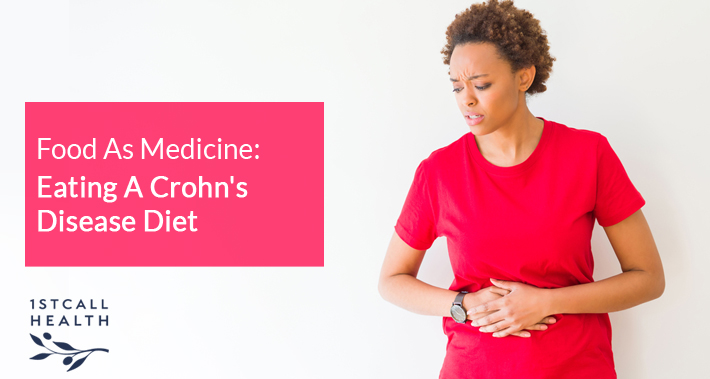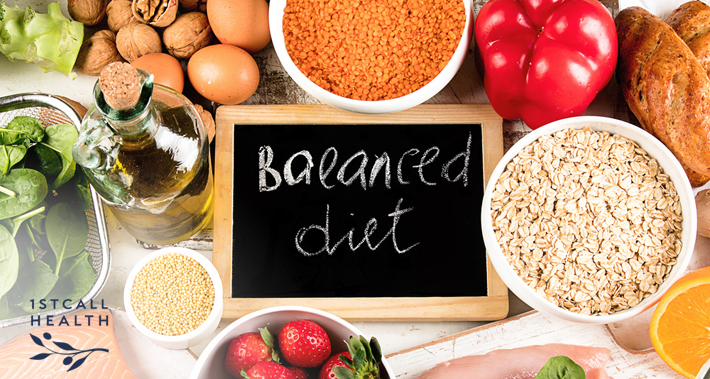
Have you been recently diagnosed with Crohn’s disease?
If so, you’re not alone.
According to the Crohn’s and Colitis Foundation of America (CCFA), approximately 780,000 Americans are currently living with the condition.
While common, Crohn’s disease can lead to debilitating complications when not properly managed.
That’s why early detection and treatment at our DC primary care medical clinic is so important.
At 1stCallHealth, we can help you manage your Crohn’s disease symptoms and get back to feeling your best.
Keep reading to hear more about Crohn’s disease management and how we can help.
What Is Crohn’s Disease?
Crohn’s disease is a severe form of inflammatory bowel disease (IBD).
It causes reoccurring inflammatory responses throughout your gastrointestinal (GI) tract.
It most commonly affects the small intestine and colon.
However, Crohn’s disease can occur anywhere in your GI tract, which extends from your mouth to your anus.
It may affect one or multiple parts of your GI tract and symptoms may range from mild to debilitating.
Severe cases of Crohn’s disease may lead to life threatening complications, such as malnutrition.
Crohn’s Disease Symptoms
Due to the range of affected organs, symptoms of Crohn’s disease can often vary from person to person.
Symptoms typically develop and worsen over time.
Earliest symptoms of Crohn’s disease may include:
- Diarrhea
- Abdominal cramps
- Bloody stool
- Fever
- Fatigue
- Appetite loss
- Weight loss
- Feeling of full bowels even after a bowel movement
- Feeling a frequent need for bowel movements
Early symptoms of Crohn’s disease are often mistaken for allergies or a stomach bug.
As the disease progress, the symptoms of Crohn’s disease typically become more serious.
That’s why early identification is so important.
Symptoms of advanced Crohn’s disease may include:
- Gastrointestinal (GI) tract ulcers
- Skin and joint inflammation
- Shortness of breath
- Red blood cell deficiency (anemia)
As well, because Crohn’s disease makes it more difficult to absorb the nutrients you need, symptoms can mimic nutrient deficiency.
And the symptoms of deficiencies in different nutrients are all different.
Vitamin C and vitamin D deficiency, for example, have different symptoms from each other.
And the symptoms of deficiency in magnesium, calcium, or other nutrients are different from the above too.
So there are a lot of symptoms that can be associated with Crohn’s disease.
What Causes Crohn’s Disease?
Currently, the exact cause, or causes, of Crohn’s disease remain unknown.
However, some factors may influence your chances of developing it.
These factors range from your genetic makeup to your environmental surroundings.
For instance, up to 20 percent of people with Crohn’s disease have a direct relative with the condition, hinting at a hereditary component.
While they may not directly cause Crohn’s disease, certain factors can affect the severity of your symptoms.
These include:
- Whether you smoke
- Whether your rectum is affected
- Your age
- The length of time you’ve had the disease
What Dietary Changes Can You Make To Minimize Disease?
Currently, there is no known cure for Crohn’s disease.
However, there are many steps you can take to manage your symptoms.
Food management is one of the best at home methods for the management of Crohn’s disease symptoms.
Importantly, patients with Crohn’s disease do commonly report symptoms that curb their ability or motivation to eat.
This includes pain, nausea, or diarrhea.
These can lead to dehydration, and eventually to impaired nutrition.
Impaired nutrition may cause you to lose weight, miss out on critical nutrients, have abnormal menstruation or infertility, or have other hormonal issues.
In children, this may impair their development.
On the other hand, seniors may experience thinning of the bones that increases risk of fractures.
Of course, these are serious issues.
We can help – book your appointment with 1stCallHealth today.
But for now, let’s take a closer look at some changes to make to your diet if you’ve been diagnosed with Crohn’s disease.
Processed Foods and Sweeteners
Recent research has shown a link between a high sugar diet and aggravated symptoms of Crohn’s disease.
And anecdotally, many people with Crohn’s disease have said that avoiding sugary foods helps manage their symptoms
So if you have Crohn’s disease that’s being managed, it’s important to eat a balanced diet.
This includes avoiding processed sugar and artificial sweeteners as much as possible.
Fruits And Vegetables
Fruits and vegetables are known for having high amounts of fiber.
This usually contributes to a healthy digestive system.
It also helps keep the beneficial bacteria in your gut healthy.
But this 2022 review by Yusuf, Saha, and Umar also shows that dietary fiber is great for managing Crohn’s disease.
A high fiber diet helps minimize gut inflammation, one of the primary causes of Crohn’s disease symptoms.
It also helps restore your gut microbiome if it’s been damaged.
But there are some cases where it’s wise to reduce your dietary fiber.
This includes if you:
- Have scarring caused by Crohn’s disease
- Are currently having a flare up of symptoms
- Have had previous bowel obstruction
Make sure you talk to your primary care provider if you’re having a flare up of symptoms.
Some fruits and vegetables are particularly rough on your GI tract when having Crohn’s symptoms, including:
- Apple skins
- Broccoli
- Cauliflower
- Cabbage
- Artichokes
- Cherries
- Peaches
- Plums

Other Dietary Additions or Eliminations
Can improving your gut bacteria help control symptoms of Crohn’s disease?
Probiotics and prebiotics may help some people but not help others.
You might also notice you feel worse after having eaten certain foods.
In such cases, it’s a good idea to avoid them.
But if you’re not sure, consider an elimination diet.
With an elimination diet, you remove all foods that may trigger your Crohn’s disease symptoms from your diet.
This usually lasts for about three weeks.
Then, start slowly reintroducing foods you think might be offenders.
If you start having symptoms again, it’s a good bet that those foods are trigger foods for you.
There’s also a common overlap with Crohn’s disease and other digestive issues, like irritable bowel syndrome (IBS).
If that’s the case for you, consider a diet that’s low in carbohydrates, like sugars, breads, and pastas.
Of course, it’s important to explore these issues with your primary care provider.
So if you think you have Crohn’s disease, make sure to…
Book Your Appointment With 1stCallHealth Today
If you’ve been diagnosed with Crohn’s disease, you may need to make a lot of changes to your diet in order to begin to feel better.
While this may seem daunting, you don’t have to do it alone.
At 1stCallHealth, our staff can help guide you to make the best choices for your health.
Book your appointment with us today to get started.
1stCallHEALTH
1331 H St NW Ste 200,
Washington, DC 20005
(202) 590-0009
– https://goo.gl/maps/MVhjkz2jqynWpsgo6
1stCallHEALTH provides affordable access to primary care services. We believe that everyone deserves affordable, high quality primary care. Our vision is to challenge the status quo, focus on the individual, and empower personal control to change the way we think about healthcare.




